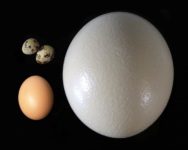By Creation Moments “The evolution of the amniotic egg was key to vertebrates leaving the oceans and colonizing the land and air.” So claimed a recent article on the evolution of the egg. The article noted that there are different shaped eggs among birds. Researchers conducted a statistical study of the eggs produced by 1,400 species of bird. read more …read more Source: Creation Moments
By Ken Ham Spontaneous applause, teary eyes, and comments like “my joy was restored,” “the perfect beginning to our Christmas,” or “better than Disney” are the reactions we’ve been seeing to our spectacular laser-projection show at the Ark Encounter. “Encounter the Wonder” is projected on the side of the 510-foot-long, 5-story-high Noah’s Ark, bringing the Ark to life, as part of ChristmasTime at the Ark Encounter in Northern Kentucky. “Encounter the Wonder” powerfully presents the gospel. It begins with the Creation account, continues to the Flood, then to the nativity, and finally to Christ’s death and …read more Source: Ken [More]
A church job offer depended on agreement not to talk about creation; what to do? …read more Source: creation.com
By Bodie Hodge Increasingly, the culture is losing the true meaning of Christmas, and if you think many Christmas sermons doesn’t move non-believers, you’re not alone. …read more Source: AIG Daily
By Creation Moments It was, they say, the “Great Dying” supposedly 250 million years ago. 57% of all land-dwelling vertebrates became extinct. Yet amidst the death and destruction of this event, a new group of animals arose. We call them the dinosaurs. read more …read more Source: Creation Moments
By Ken Ham Well, the Freedom from Religion Foundation (FFRF)—an atheist group that focuses most of its time and energy attacking Christianity—is at it again. They are often in the news for trying to remove any mention of what they call “religion” (mostly Christianity) from the public sphere. They’ve spread many lies and much misinformation about the Ark Encounter, for example, and even threatened a lawsuit against any public school that brought children to visit the Ark (which public schools are constitutionally allowed to do). This time the FFRF is attacking a church in Asheville, North Carolina, that received a [More]
By Ken Ham Christmas is just around the corner, and if you’re looking for last-minute Christmas gifts for your friends or family, we’ve got you covered. These gifts are presents with a purpose! They provide encouragement and equip you and your loved ones to stand boldly on the authority of God’s Word. Answers magazine gift subscription. A magazine subscription is the gift that keeps coming all year. Our award-winning Answers magazine comes out six times a year and contains fascinating articles on apologetics, a biblical worldview, and God’s amazing creation. With a kids’ mini pullout magazine included, there’s something for [More]
Twelve criteria to use to define where the Flood stops in the rock record. …read more Source: creation.com
By Creation Moments If you fire a beam of laser light at the Moon, how long will it take to get there? At first, some might suggest that this is a relatively easy problem. Speed equals distance divided by time, so surely we can calculate how long the light will take. But do we really know how fast the light travels from Earth to Moon? Creationist astrophysicist Dr. Jason Lisle suggests that we don’t. read more …read more Source: Creation Moments
A medical missionary talks about ministering with the Gospel in the midst of a deadly Ebola outbreak. …read more Source: creation.com
There is no “neutral” starting point; everyone—whether they acknowledge it or not—interprets the “facts” according to a particular worldview. …read more Source: AIG Daily
A team of scientists claims to have found the “oldest polar forest on record from the southern polar region.” The trees were found in Antarctica’s Transantarctic Mountains and include a mix of evergreens, deciduous trees, and gingkoes. How old is this oldest polar forest? More… …read more Source: icr.org
By Creation Moments One of the most persistent rumors of popular evolutionary mythology is the concept of a primitive Stone Age. While serious evolutionists do not view such a time in the same way as the popular thinking, particularly in the media, the idea that there were early human societies that had no technology, save the ability to use rocks, is deeply ingrained. read more …read more Source: Creation Moments
Science magazine uses a new museum as a pretext for attacking faith in the Bible. …read more Source: creation.com
Communication is key when it comes to deciphering some secrets. …read more Source: creation.com
Examining the abundance of variations within creatures after Noah’s Flood. …read more Source: creation.com
Secular astronomers recently described three bizarre discoveries that challenge mainstream ideas of an evolving universe: a planet that’s too big for its star, a distant “young” galaxy that shouldn’t look old, and an explosion that should have happened a long, long time ago. More… …read more Source: icr.org
Dozens of technical reports show original biochemistry in long-buried fossils, and the reports just keep coming. Three new reports give occasion to reconsider the age assignments for these fossils. The biochemicals they harbor resemble timers that should have elapsed long ago unless these fossils were deposited thousands of years ago, not millions. More… …read more Source: icr.org
By kpennock On this episode of ID The Future, host Tod Butterfield talks with Discovery Senior Fellow Wesley J. Smith about the use and abuse of Preimplantation Genetic Diagnosis (PGD) in China. Smith delves into the initially humane reasons for PGD, but notes how PGD is being used to advance the dark agenda of eugenics. Smith argues that the international community needs to take a leading role in defending the dignity of all human life. Otherwise, he says, China—with its abhorrent record on human rights—may set the standard for the rest of the world. Your browser does not support playing [More]
What’s the best part of Christmas? Is it the lights, traditions, beautifully decorated trees, presents, festive food, or the gathering of family? No! I think the best part of Christmas is that during this time of year we have unique opportunities to present the gospel message! And we do so each year here at the Creation Museum and now the Ark Encounter with special Christmas programs near Cincinnati. Read More: What’s the Best Part of Christmas? | Answers in Genesis
As you plan your family’s Christmas activities this year, you’ll want to include a trip to the Ark Encounter in Northern Kentucky for ChristmasTime. We’re so excited about what’s coming this December 8 through January 15, 2018 (closed Christmas Eve and Christmas)—and we can’t wait to share it with you. During ChristmasTime you’ll experience “Encounter the Wonder,” a unique and spectacular animated program projected on the side of the full-size Ark with 15 video projectors. Read More: Encounter the Wonder at the Ark Encounter | Answers in Genesis
Recently I wrote a letter to our supporters detailing a recent public event where I had a dialogue with a seminary professor, but which turned into more of a debate. Dr. Richard Howe is associated with Southern Evangelical Seminary in North Carolina, and you can read my report on our dialogue/debate in “Taking Back the Bible’s Clarity—and Implementing Operation Upgrade.” As you read the article and watch the video of this “debate”—which I strongly encourage you to do—you’ll notice that much of our discussion revealed the position SES takes on the age of the earth/universe. Watch the video below: [More]
How an icon of secular geology provides powerful evidence for Noah’s Flood. …read more Source: creation.com
Abstract The Sauk megasequence is thought to have been deposited during one of the highest sea level episodes of the Phanerozoic. However, few, if any, have examined the extent and volume of sediments deposited across entire continents in order to test the published, secular sea level curve against the rock record. This study examines the Lower Paleozoic sedimentary rocks across North America, South America, and Africa with particular attention given to the Sauk megasequence. Results show that the Sauk megasequence most likely represented a limited rise in global sea level. Africa and South America exhibit very little evidence of [More]
By Creation Moments We have talked before about Cain and Abel, and we have seen how Cain’s offering was rejected because it was his attempt to get right with God by his own power. We have also seen how Abel’s offering was acceptable because it was the necessary blood sacrifice to atone for sin. read more …read more Source: Creation Moments
We love seeing children come to the Creation Museum and Ark Encounter with so much to do. It’s exciting to see the next generation equipped to think biblically with answers to the skeptical questions of our day. School classes and homeschool groups often come as part of a field trip or other excursion. Many of these groups tour both attractions, attend lectures or special events such as our live Answers News program at the museum, and participate in our many varied workshops. Read More: School Trips and Family Reunions at the Ark Encounter and Creation Museum | Answers in Genesis
Most children are familiar with Jesus as the baby in the manger. But, sadly, we’ve found that many children falsely believe that this is when Jesus came into existence. They don’t understand that he’s the eternal God who has always and will always exist. So we developed a brand-new Vacation Bible School (VBS) for 2018 that addresses this misconception. Time Lab will help kids discover Jesus from eternity past to eternity future. Read More: Jesus—the Eternal God from Eternity Past to Eternity Future | Answers in Genesis






































